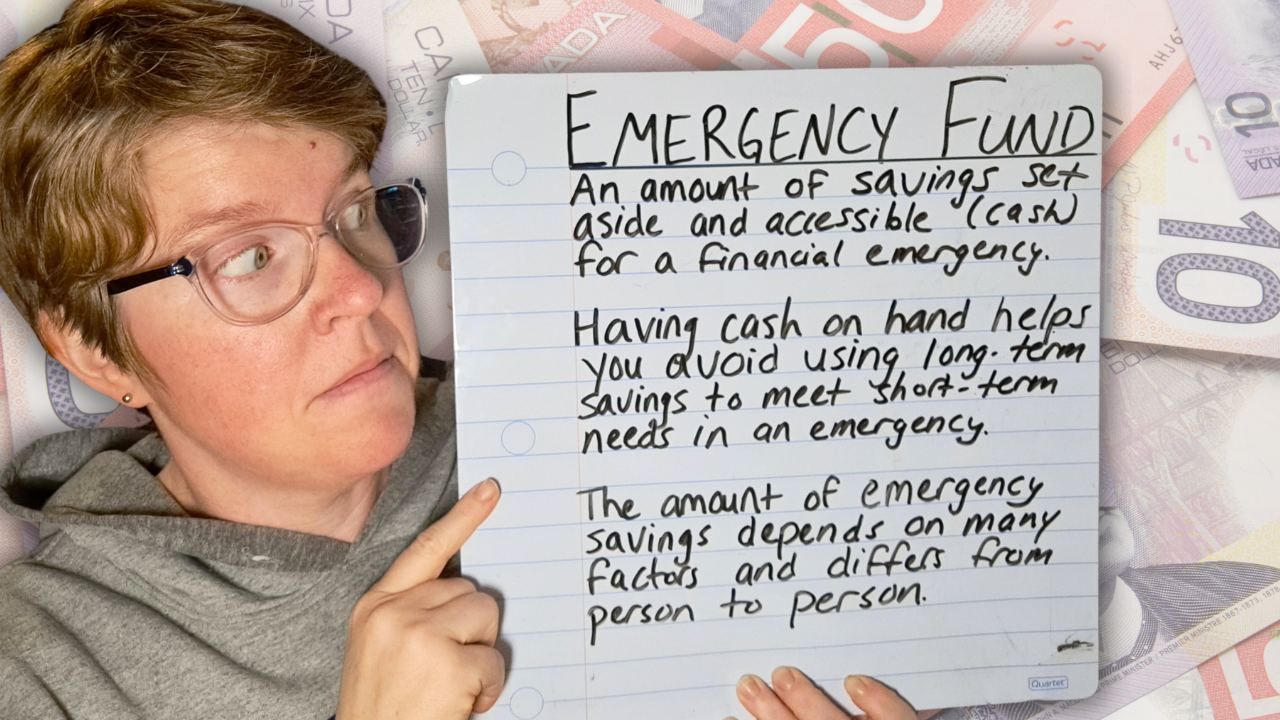Personal Finance 101: The Emergency Fund
While not the most exciting topic in the world, saving for an emergency fund is important.
Personally, I have just recently dipped into my own emergency fund to help make ends meet for the month of April. It’s safe to say that the importance of a fully funded emergency is very real to me (and my family).
Did I want to use it?
No.
But boy was I glad it was there to borrow from. It was a huge relief to know that I had money to use when I needed it (without going into debt).
What is an emergency fund?
An emergency fund is an amount of savings set aside and accessible for a financial emergency.
For example: cash on hand, a chequing account, a savings account, or someplace that you can access cash relatively easily if you need it.
Why You Need An Emergency Fund
Typically if you’re dipping into your emergency fund, you need the money sooner rather than later. So having cash on hand helps you to avoid using long-term savings to meet short-term financial needs.
How Much Money Do You Need In Your Emergency Fund?
The amount of money you need in your emergency fund depends on your lifestyle.
It’s pretty individual.
The amount also depends on how much you’re comfortable having in cash or just sitting in your chequing or savings account without accumulating too much interest.
If you’re wondering, I have a fully funded emergency fund of $5000 sitting in an easily accessible high-interest savings account.
I’m comfortable having that amount in my emergency fund and the rest of my savings is in a longer-term savings account.
I use my TFSA for the bulk of my savings because that money is invested and earns a significant amount of interest.
How To Start Saving For An Emergency Fund
I save money for my emergency fund by paying myself first every time. Anytime I get paid, I take a percentage and put it in my emergency fund. It’s typically about 10% of my income.
I have it automatically transferred out of my chequing account and deposited into my savings. This helps me to, slowly over time, build up an emergency fund.
Since that 10% is taken right off the top, I don’t spend it.
If you say, “I’ll put what’s left at the end of the month into my savings account,” you know there’s not going to be anything left.
I did that for years and years and years and didn’t save anything. And we lived the same way (in debt) because I did not pay myself first.
It’s a good idea to set up an automatic deposit into your savings account. Just take it off the top and then you don’t even miss it.
And what is nice is that you build it up slowly over time. Even if you start with $5 or $10, every two weeks or every month, just start with something because you will see that savings grow and you’ll be glad you have it.
Why I Dipped Into My Emergency Fund This Month
Yes, I dipped into my emergency fund because this month, April, was a really expensive month and I didn’t have enough cash.
I did not plan well enough for all the expenses I had. Plain and simple. No excuses.
My cash flow was very low and I dipped into my emergency savings to get through the month so I could buy normal things like groceries, clothes, and other essentials.
I was very grateful to have my emergency fund there to do that.
I took $200 out of the emergency fund and I haven’t repaid it yet, but I will.
My plan is to pay back $100 at the end of April and another $100 at the end of May to replace the $200 I borrowed.
Using Your TFSA As An Emergency Fund
Using your tax-free savings account (TFSA) as an emergency fund is a good idea, in my opinion. The money there is fairly liquid.
It’s a lot easier to pull money out of your TFSA than long-term savings like an RRSP. I wouldn’t even want to go there because you will pay taxes on a withdrawal from your RRSP.
But the TFSA is tax-free. So you can pull that money out and in the next calendar year you can put the money that you took out back in your TFSA in addition to whatever the limit is for that year. So the TFSA is a really good option.
But keep in mind that it is not quite as liquid as a savings account. It may take a couple of days to get your hands on the amount of money you have withdrawn.
The takeaways
You need an emergency fund.
If you don’t have one because you don’t think that you can afford it. I totally get it. I understand. I’ve lived that way.
But once I started paying myself first, taking money off the top, and living off the rest, I felt a huge relief.
It’s life-changing to be honest, because you just learn to live off a little bit less, and then you’re building that savings.
And you watch it grow month after month.
When you need it, it’s there.
Sure, it might be slow growing if you can only manage a small amount at first. That’s OK. Just start with something and eventually, you increase the amount as you earn more income and get your expenses under control.
It’s a great feeling to know that if you are short at the end of the month, you have a little safety net to use.
Remember: Your emergency fund should be fairly liquid. Use a savings account, a TFSA, even under your mattress.
If you’re doing cash, put it in a jar. It doesn’t have to be invested. Your money is not going to make very much interest in the savings account anyway, so if you prefer, just keep cash on hand.
Grab a jar and start stuffing money in there.
Use it if you need it. Your emergency fund is there to use.
If you are short by the end of the month covering your bills, or you have an unexpected repair for your car.
Like a good neighbour, your emergency fund is there. And you’ll be glad to have it.
The feeling you have as you watch your savings grow is unmatched, especially when you’re used to living from paycheck to paycheck with nothing left over at the end of the month.
Start saving today. You will be glad you did.
Written by Kathy
More From This Category

Is It Worth Getting a Lawyer When Separating From an Uncooperative Common-Law Spouse?
Is It Worth Getting a Lawyer When Separating From an Uncooperative Common-Law Spouse?Disclaimer: This is a rather specific topic that applies to my life now. I want to preface this article by saying that this is MY OPINION based on my experience. Every separation is...

As A Man Thinketh By James Allen Book Review
As A Man Thinketh By James Allen Book ReviewAs A Man Thinketh By James Allen is a self-help book that was originally published in 1903. As the title might allude to, it’s not exactly politically correct for today’s day in age, but the messages are clear. When I read...

Navigating Single Motherhood: My Ongoing Journey to Financial Independence and Personal Growth
Navigating Single Motherhood: My Ongoing Journey to Financial Independence and Personal GrowthHi, I’m Kathy. I thought by this age that I would be living the life of my dreams. Instead, I feel more behind than ever. I am a 41-year-old single mom who lives with my...



0 Comments